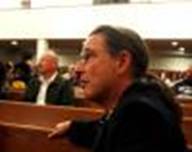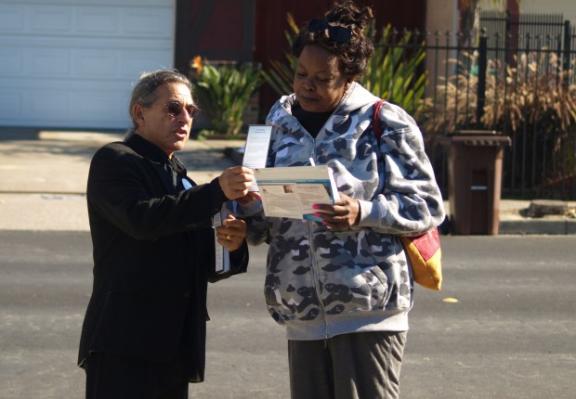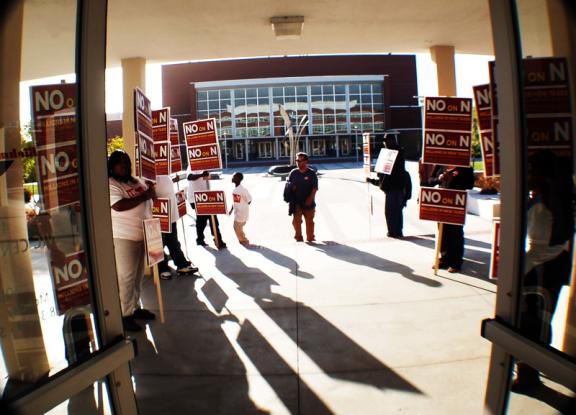| |
Despite the iconic “gansta” exchange with Jeff Ritterman, which involved a disagreement about the number of marijuana dispensaries to license, I honor him as a stalwart colleague who has helped move Richmond forward in many ways. His reliable support of initiatives that make Richmond a better place to live will be missed, as will his energy, his understanding and ability to parse complex issues and his ability, when necessary, to compromise to move an issue forward.
Following is what the media has to say about Jeff:
Richmond Councilman Ritterman leaves legacy of action, deep void in progressive coalition
By Robert Rogers
Contra Costa Times
Posted: 12/14/2012 03:12:10 PM PST
Updated: 12/14/2012 10:10:24 PM PST
Richmond Councilman Jeff Ritterman's history, future
RICHMOND -- Perhaps Jeff Ritterman's finest hour in public office unfolded in secret meetings.
In spring 2010, he and his City Council colleagues grappled with Chevron Corp. leaders in high-stakes negotiations over millions the city sought in new utility tax revenues. Chevron vowed to bankroll a competing ballot measure linking tax cuts for its refinery to tax cuts for average households.
Ritterman's anti-Chevron bona fides were beyond reproach, giving him leverage to strike a deal with the energy giant, then sell it to skeptical constituents.
"Ritterman was kind of like (former President Richard) Nixon, the only leader who could go to China," said Councilman Jim Rogers, who was party to the meetings.

Richmond Councilman and retired cardiologist Jeff Ritterman at a townhall meeting at Bethlehem Missionary Baptist Church Monday night. Ritterman estimates he has spent thousands of hours campaigning in support of Measure N, a tax on sugar-sweetened beverages. If voters pass the tax on Nov. 6, Richmond would be the first city in the nation to pass such a tax. (Robert Rogers/Staff) ( unknown )
"(Ritterman) handled some tricky high-level negotiations (with Chevron officials) about as well as could be done. It was an exemplary performance."
Both sides dropped their threats. The city accepted $114 million in payments over 10 years from Chevron.
Tuesday's City Council meeting will be the final act of what has arguably been among the most energetic and consequential terms ever served on the Richmond council. His four-year term was marked by historic triumphs such as the deal with Chevron and the successful wooing of a Lawrence Berkeley Laboratory campus, as well as high-profile setbacks such as his failed effort to make Richmond the first city in the nation to tax soda.
"He really worked (getting the national lab campus) as hard as it could be worked," Councilman Tom Butt said of Ritterman's public and private efforts to beat out more than a dozen competing cities as the site for the new lab, the largest public project in the East Bay in decades. "It's hard to say one person was the difference between getting LBNL or not, but if there is one person, it's Jeff."
There were big misses, too. Ritterman, who is Jewish, backed down in the face of public outrage after calling on the council to pass a resolution condemning Israel for intercepting a Gaza-bound aid flotilla. In November, Ritterman's quest to pass Measure N, the tax on sugar-sweetened beverages, was crushed by a 2-1 margin at the polls, and the bruising campaign was marred by heated exchanges and charges of racism.
"That was the hardest I worked on anything," Ritterman said. "Sure, some of the attacks hurt, but I don't have any hard feelings."
It was February 2011 when the retired cardiologist decided that his first term on the council would be his last.
He and his partner of 13 years, Vivien Feyer, vacationed in Mexico with liberal icon and anti-Vietnam War activist Daniel Ellsberg, his wife and other couples. Ritterman, 64, acknowledges that Feyer urged him to not seek re-election.
"She sees me more as a healer than as a warrior," Ritterman said. "And she is smarter than me and my most trusted adviser, so I trust her."
He kept his decision a secret for more than a year because he didn't want to jeopardize his courting of LBNL, he said.
Chatting over coffee at the Point Richmond Starbucks on a recent afternoon, Ritterman said the campaign vitriol that marked his war on soda never dampened his spirits.
He spent dozens of hours with radio, television, and print and digital media. Dozens more were spent fighting small rhetorical battles with opponents on social media sites and email groups. On weekends, he trudged around town, pulling a red wagon loaded with 40 pounds of sugar -- the amount he said the average Richmond child drinks in a year, and extolled the virtues of taxing sugary drinks to everyone he could. He was heckled and shouted down but never shrunk away.
Ritterman is a gregarious, warm communicator with a boyish smile, playful sense of humor and a penchant for squeezing shoulders and arms.
But he's not without his prickly side. Along with the shouting matches over the sugar tax, Ritterman had numerous spats with City Councilman and provocateur Corky Booze, occasionally coming inches from literal head butts while seated at the dais.
"I don't regret a single vote I made on the council," Ritterman said. "But I regret losing my cool. I acted unkind at times, and that is my failure."
In September 2011, Ritterman and Booze traded accusations of ethical misconduct, and Ritterman filed a complaint with a state political watchdog agency and the Contra Costa County district attorney, implying that Booze shook down a transit startup company for campaign dollars. The company, Cybertran, was backed by Ritterman, and Booze charged that Cybertran's leaders were swindlers.
But while supporters say Ritterman was a victim of scurrilous attacks by Booze and his supporters, others say Ritterman gave as good as he got.
"He's well-meaning, but he is an ideologue with a huge ego," resident Felix Hunziker said. "And he has no qualms about starting fights and hurling inflated insults."
Hunziker, a member of the city's Police Commission and a veteran of barbed social media debates with Ritterman over the sugar tax, said he nevertheless has high respect for Ritterman's "intelligence and passion," and that his loss is a blow to the city's progressive coalition.
While the spats are burned in the public memory, those close to Ritterman say they belie the councilman's skill at consensus building.
"He knows how to cut a deal, he can compromise, and I don't think he gets enough credit for that," Butt said.
Ritterman said he was never more conflicted than during and after the Chevron negotiations. It was his political allies who were most skeptical of the deal, he said.
"I had to keep everyone, including the (Richmond Progressive Alliance), at arm's length during those secret negotiations," Ritterman said. "Some progressives, maybe most, were not in favor of a deal with Chevron, but I was not willing to risk bankruptcy, and I felt that if the deal was a good one, everyone would eventually embrace it as the practical solution."
Ritterman says he also looks forward to the uncertainty of the future, and having time to relax with family, especially his 16-month-old granddaughter, Amiela. He says he hopes to work consulting and teaching on matters of public health.
But don't expect to see Ritterman at the rambunctious City Council meetings any time soon.
"I'll be taking a long break from Tuesday nights," Ritterman said, grinning.
Contact Robert Rogers at 510-262-2726 and follow him at Twitter.com/roberthrogers.
What now, Jeff Ritterman?

Councilmember Jeff Ritterman speaks to a voter outside Richmond's Nevin Center on election day. Photo - Tawanda Kanhema
By Tawanda KanhemaPosted December 13, 2012 4:50 pm
Measure N

Measure N was a key issue in Ritterman's last year on council. Photo - Tawanda Kanhema
Chevron

Industrial safety brought more scrutiny on the role of businesses in the city. Photo - Tawanda Kanhema
Early one Tuesday morning in November, as Richmond residents began to trickle into polling stations dotted around the sprawling city, some with hardly an idea what was on the ballot, one councilman fought hard to make sure every voter knew what was at stake.
Standing 100 feet away from Nevin Community Center, tucked in the midst of a residential area that is home to some of the poorest residents in this industrial city, Jeff Ritterman handed out fliers encouraging voters to vote Yes on Measure N, a proposal he authored to impose a one cent per ounce tax on sugar-sweetened beverages as part of the city’s effort to combat childhood obesity.
Like a preacher on a busy sidewalk, the retired cardiologist repeatedly tried to convince each person he spoke to, before moving onto the next as voters approached him, sometimes in couples. “Why vote yes on N? I am voting No,” one woman challenged Ritterman as she walked in to cast her vote. “Yes on N!,” he retorted, as he turned to meet an elderly couple. His message came too late to many, and he was running out of time.
Three blocks away at the Richmond Civic Center, a convoy of white minivans rented by the measure’s opponents, the Community Coalition Against Beverage Taxes, and emblazoned with red and white “No on N” posters prepared for the committee’s final push to turn undecided residents against the measure.
The coalition, bankrolled to the tune of $2.7 million by the Washington-based beverage industry lobby group, the American Beverage Association, had launched an all-out campaign with giant billboards punctuating major streets and shopping centers, and describing the measure as a ‘soda-tax’ that would hurt an already struggling population. No matter, Ritterman said, it was the engagement that counted.
“We have already won this fight,” Ritterman said, barely four hours into Election Day. “We have set the agenda on this issue.”
The measure was rejected by a two-to-one margin, but Ritterman did not lose his narrative. At Nevin Center, Ritterman saw the residents that his campaign had lobbied for the better part of the year walking into the booth and casting their ballots. “I voted Yes on N,” said Councilman Nat Bates — all along, one of Ritterman’s staunchest opponents — jokingly as he arrived at the polling station.
A month after the election, the departing Ritterman can see the end of his term on the council, if not an end to the debate.
“We do not have consensus about what will make Richmond a healthy city,” he said in an interview at a Berkeley café, while holding his 15-month-old granddaughter, Miranda. “We have an oil refinery that has been in Richmond for one hundred years, how do we transition an economy that gets tens of millions of dollars from that asset? How do we get retailers who make a living out of selling soft-drinks to make a living out of something else?”
Industrial safety at the 257,000 barrel-per-day Chevron refinery is one of the issues that has dominated debate during Ritterman’s term as councilman, more so since a fire gutted part of the refinery in August. Ritterman says he wants his legacy to be a new recognition about the way public health and public policy can guarantee a sustainable path for the city’s development.
“Bill – city manager Bill Lindsay – tells me that I influenced his thinking,” Ritterman said, reflecting on his term in a council led by progressives. “We have changed the philosophy in a way that impacts public policy, especially in policing where we have managed to transform the Richmond Police Department and restored the dignity that had been taken away from members of the community.”
Starting off as head of the cardiology unit at Kaiser Permanente’s Richmond branch at the age of 32 in 1981, Ritterman’s involvement with public health issues spans the greater part of his adult life. In 1967 while at the University of Wisconsin, Ritterman took part in protests against Dow Chemical for its role in manufacturing napalm, used in the Vietnam War.
“We were very active politically,” Ritterman said. “After I got into medical school, I began to look closely at the impact of social conditions on health. There was no field of social epidemiology at the time I moved to Richmond.”
Ritterman joined the Richmond Progressive Alliance while still working for Kaiser in 2004, and won a four-year council seat in 2008. He resigned from Kaiser in 2010, he says, in order to commit to the council’s efforts to bring the Lawrence Berkeley National Lab to Richmond. By the beginning of 2011, he said, he had decided that he would not run for a second term.
“I knew I wasn’t running again in February 2011,” Ritterman said. “My decision predates this council, but my time on the council confirmed that it was the right decision.”
Growing up in Brooklyn, New York, Ritterman learned to deal with diversity at a very early age and saw the beginnings of his interest in public health.
“My grandpa had a candy store and my treat would be to go to his store and get a canned soda once a week,” Ritterman said. Another relative ran a Texaco gas station – Texaco is now part of Chevron Corp. – and he would go to the gas station once a month for another treat, a candy soda cone. “This was long before people began to question the health benefits of drinks like coke syrup.”
But in the first several years on the council, Ritterman found himself mired in fights over a wide range of issues that took his focus away from public health, an issue he says has a more significant impact on economic development. “My partner Vivian said Jeff, I love you more as a healer than as a warrior,” Ritterman said. “It’s not the best contribution I can make to the world and I think Vivian was right.”
So he took on a public health issue as the defining issue of his last year on council, attracting global media attention and millions of dollars in campaign contributions from lobbyists and multinational corporations.
“I was disappointed losing by a margin of two-to-one but that disappointment did not last long,” Ritterman said. “We got lots of press, going as far as China and it was the first time that I have been connected with a health issue that is national and international in nature. Now we know that we can accelerate the rate at which we can effect social change.”
That acceleration, for Ritterman, includes a bringing a similar measure against sugar-sweetened beverages to 14 cities in the 2014 elections, in a blanket campaign strategy dubbed 14 in ‘14. If successful, Ritterman says the campaign would cost the beverage industry upwards of $20 million in campaign contributions to defeat the separate measures, considering that the American Beverage Association spent $4 million in Richmond and El Monte.
“Fourteen in 14 has a nice ring to it, I think we’re on a roll,” Ritterman said, adding that councilmembers in Vallejo, San Mateo, San Leandro and Alameda had already expressed interest in introducing a similar measure. “Let them – the beverage companies – defend it, and it will make a much more intense conversation.”
An alternative to 14 in 14, Ritterman said, would be to introduce the measure at state level with the help of his longtime friend and newly elected senator from Santa Cruz, Bill Monning.
Working with Monning, Ritterman took medical supplies to El Salvador through the Salvadorean Medical Relief Fund and started the Southern Africa Medical Aid Fund, which took him to Zambia and South Africa where he came face to face with the excesses of the apartheid era. “Richmond’s suffering comes nowhere near what I have seen in other parts of the world,” Ritterman said.
Beyond the campaign against sugary beverages, Ritterman sees a broader agenda in public health that would help improve health outcomes for residents, including the installation of water hydration points in public locations around the city of Richmond and construction of bike paths to make cycling safer and inculcate healthier lifestyles.
“What I would like to figure out is to work in a capacity that can lead Richmond to have a higher standard of living,” Ritterman said. “How can we tolerate the proliferation of products and habits that do not promote longevity, sustainability and happiness?”
While Ritterman’s departure leaves a dent on the RPA’s balance on council and takes the steam out of the public health thrust of the progressive agenda, he sees himself as having been part of a movement whose members have been involved longer than he has, and admits that leaving council will negatively impact his influence within the RPA, where he is a member of the steering committee but not in the inner core of the party.
During the campaign Ritterman bemoaned the polarization of the city and called on the RPA to do more to find common ground with opponents, yet the campaign took a predominantly negative tone, ruining prospects for compromise.
“The center of gravity in the RPA has been more confrontational than would have been my choice,” Ritterman said. “I have been told I see things through rose-colored glasses. The RPA has endorsed positions I have articulated with some big exceptions, and the common ground approach has not won the day.
“My power within the RPA is in flux,” he said. “I may end up as a private consultant with the city or the county at a foundation on public health, and spend time with my granddaughter.”
|
|

